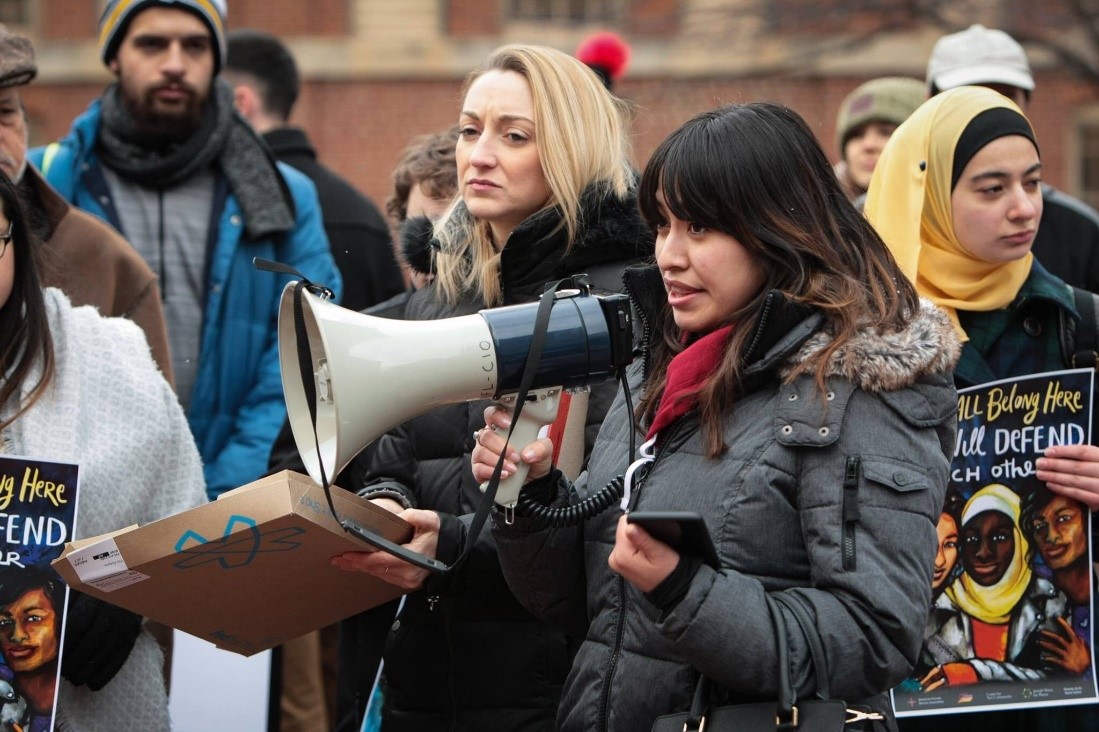
In January, community members in Indiana joined countless people across the country to protest the Trump administration's Muslim ban. Photo: Larry Gindhart
By Kabbas Azhar
Note: This post was updated on June 29.
On June 26, the Supreme Court announced that it would review the Trump administration's executive order halting case review for refugees and barring travel from six Muslim-majority countries. The case will be heard in October, but in the meantime, the court has allowed the latest version of this racist and xenophobic order to continue with some severe restrictions starting June 29.
The Supreme Court's decision to allow parts of the ban to continue in the coming months opens the door for ambiguity, legal chaos, and official overreach at airports and embassies. Here's what you need to know:
What did the Supreme Court say?
The restrictions limit the impact of the executive order to a narrow subset of people. Individuals with a "bona fide," or sufficient, relationship with the United States are still able to enter the United States. The implementation of this “bona fied relationship" standard, however, seems to be arbitrary. According to new State Department guidelines, family members such as grandparents, fiancés, aunts/uncles, and nieces/nephews will not qualify as a sufficient relationship. In another interpretation, refugee resettlement agencies will not count as sufficient relationships either. This will end up banning many refugees from around the world and travelers from the six targeted Muslim-majority countries from entering the U.S.
Why does it matter?
Though legal experts might be less concerned about the implications of this ruling given its limited impact on specific cases, the decision to allow a limited version of the order to take effect provides dangerous legitimacy to the narrative that a particular religion, country of origin, or refugee status makes someone more potentially dangerous. Despite overwhelming data to the contrary, this sustained narrative has been cultivated in the media and advanced by politicians peddling fear, with devastating human consequences.
Opposition to the Muslim ban—including protests at airports, at the White House, and in cities and town across the country; condemnation from local leaders and religious figures from a multitude of faiths; as well as several legal rulings striking down the ban—has demonstrated that most people in the U.S. stand against hate and intolerance. They understand that welcoming refugees—as well as students, workers, visitors, and family members from all countries—makes the U.S. stronger.
The United States claims to value religious freedom and diversity. Unfortunately, the limited ban still upholds the opposite, legitimizing intolerance and widening the bounds of acceptable discrimination in our society. We cannot let fear and misinformation shape our laws and policies.
What should we do?
In the coming days, we all need to speak out against discrimination in the name of security. Time and again globally we have seen fear used to drive acceptance of dangerous and discriminatory policies and acts. We need to push back, not only on the specific scope of implementation, but the broader narrative behind this travel ban.
For more, check out our "Four tips for talking about Trump's Muslim ban," a guide for speaking out on the issue without contributing to Islamophobia. And take action today by calling your members of Congress and urge them to speak out against hte Muslim ban.
Kabbas Azhar is an intern at AFSC's Office of Public Policy and Advocacy in Washington, D.C.